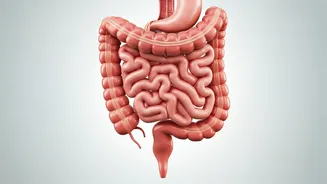Caffeine's Gut Impact
Regular consumption of caffeine to trigger bowel movements can have unintended consequences. According to gastroenterologists, consistent use of caffeine creates
a dependency, which conditions the body to need stimulants for regular function. This reliance can lead to a less responsive digestive system over time. Furthermore, the quick stimulation might mask underlying digestive issues instead of addressing them. The advice given encourages a closer look at the body's natural processes and ways to support them without resorting to caffeine. It is key to recognize the difference between a temporary boost from caffeine and a sustainable approach to gut health, emphasizing that the latter can support long-term well-being.
Hydration is Key
Drinking water first thing in the morning can boost digestion. Staying hydrated is vital for healthy gut function, and drinking a glass of water first thing in the morning is a simple yet effective practice. Water helps soften stool, making it easier to pass through the intestines. Dehydration, on the other hand, can lead to constipation, which is detrimental to gut health. This section underscores the significance of incorporating adequate water intake into one's daily routine, suggesting that it's a foundational step towards overall digestive wellness. It is recommended to have plain water or water infused with a squeeze of lemon to further promote digestion. The habit of sipping water throughout the day also aids in consistent gut health.
Embrace Gentle Movement
Incorporating gentle exercise or movement into your morning routine can significantly benefit gut health. Activities like a short walk, yoga, or simple stretching routines can stimulate the digestive system, promoting better bowel function. Exercise helps to improve blood flow to the gut, aiding in nutrient absorption and waste elimination. It's suggested to find a level of physical activity that fits individual fitness levels and preferences, creating a sustainable daily habit. A gentle morning workout can activate the gut muscles, helping to avoid constipation. This approach encourages a proactive way of supporting the digestive system through natural physical activity.
Mindful Morning Meals
Making thoughtful food choices during breakfast can deeply influence gut health and digestion. Including fiber-rich foods, such as fruits, vegetables, and whole grains, can promote healthy bowel movements. These foods add bulk to the stool, helping it move through the digestive tract smoothly. The advice suggests avoiding processed foods high in sugar and unhealthy fats, as they can disrupt the balance of the gut microbiome. A balanced breakfast provides a mix of nutrients that fuels the body while supporting digestive processes. Mindful eating also involves paying attention to how your body responds to specific foods, and making adjustments based on this feedback is important. This promotes a conscious approach to breakfast and its vital role in gut health.
Prebiotic & Probiotic Foods
Incorporating foods rich in prebiotics and probiotics can greatly benefit the gut microbiome. Probiotics, found in fermented foods like yogurt and kimchi, introduce beneficial bacteria into the gut. Prebiotics, such as those found in onions and garlic, serve as food for these helpful bacteria. Adding these foods to your morning routine can create a favorable environment for a diverse and healthy gut microbiome. A balanced gut flora is key for overall digestive health and immune function. The advice encourages exploring diverse prebiotic and probiotic-rich foods, suggesting a gradual incorporation to assess tolerance and get the maximum benefits. This approach acknowledges the importance of nourishment for gut bacteria, which in turn benefits the digestive system.
Manage Stress Daily
Stress and gut health are closely linked, and finding effective stress management techniques can greatly support digestion. Chronic stress can negatively affect the gut microbiome and slow down digestion. Practicing relaxation techniques, such as deep breathing exercises or meditation, in the morning helps calm the nervous system and promote a more relaxed digestive process. Mindfulness practices also help regulate the body's response to stress. This approach promotes the implementation of daily routines to minimize stress, emphasizing the direct impact of stress on the digestive system. Making stress management a regular habit enhances overall well-being, including digestive health.
















